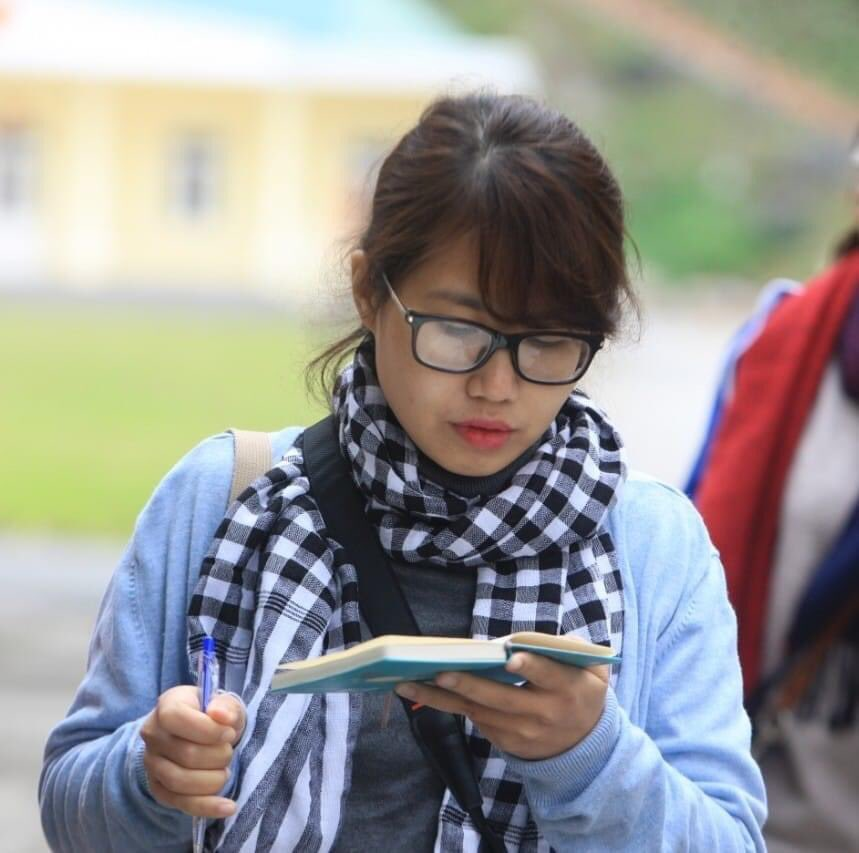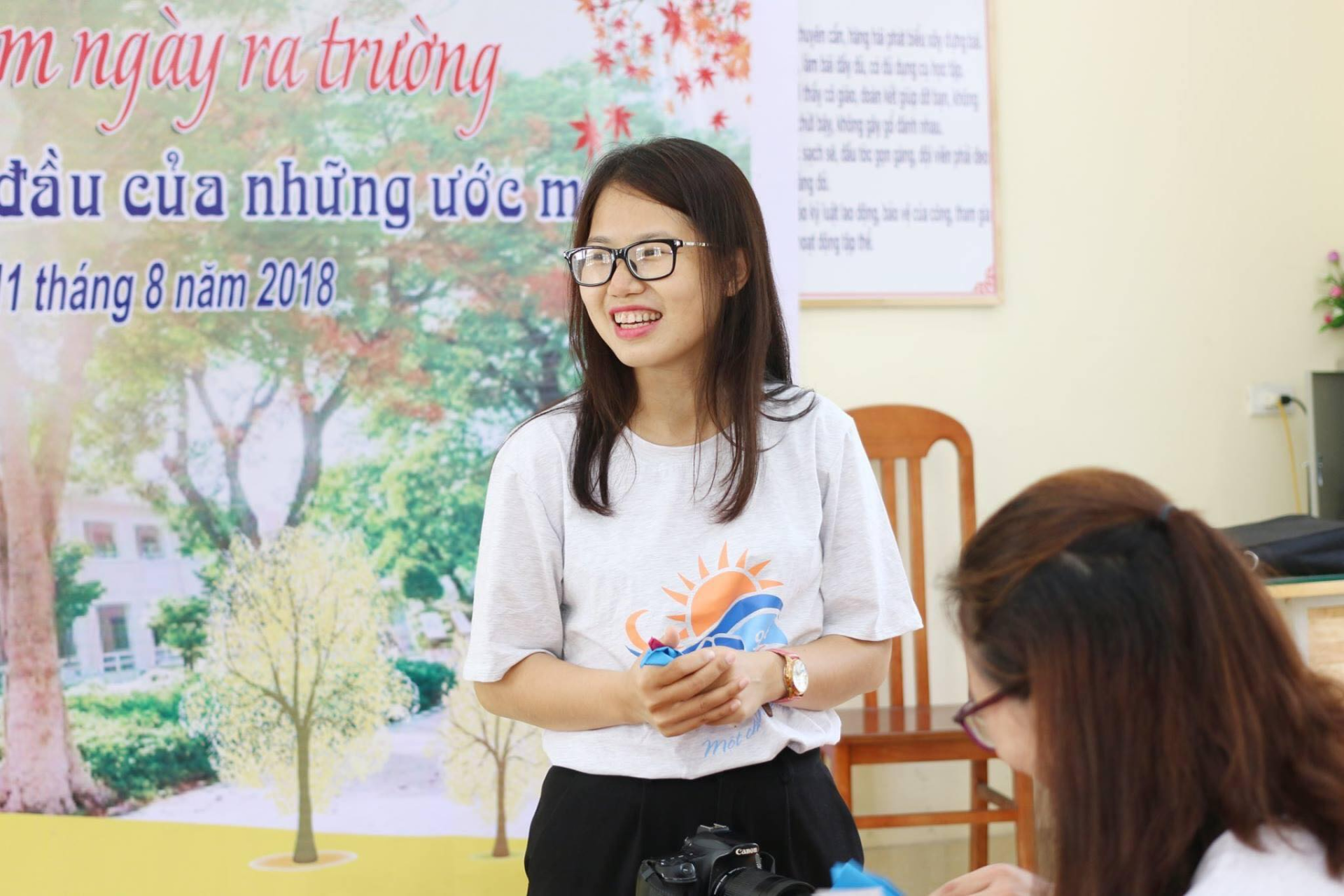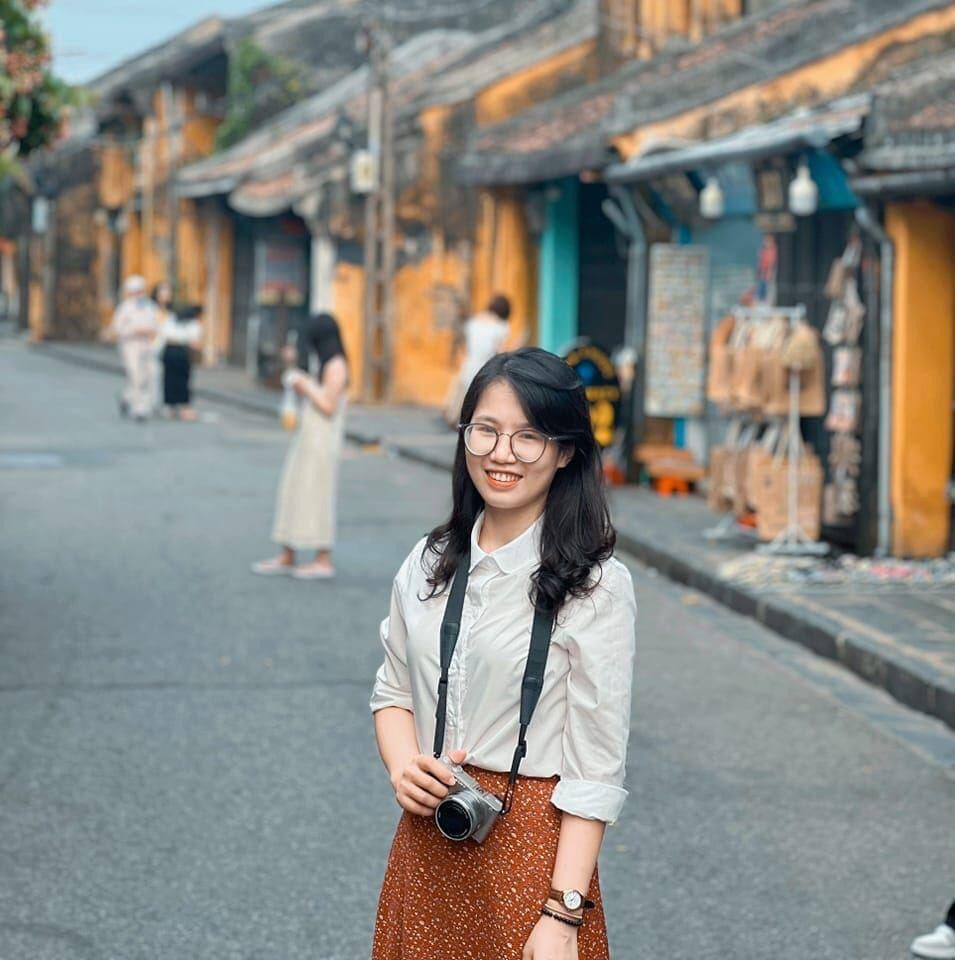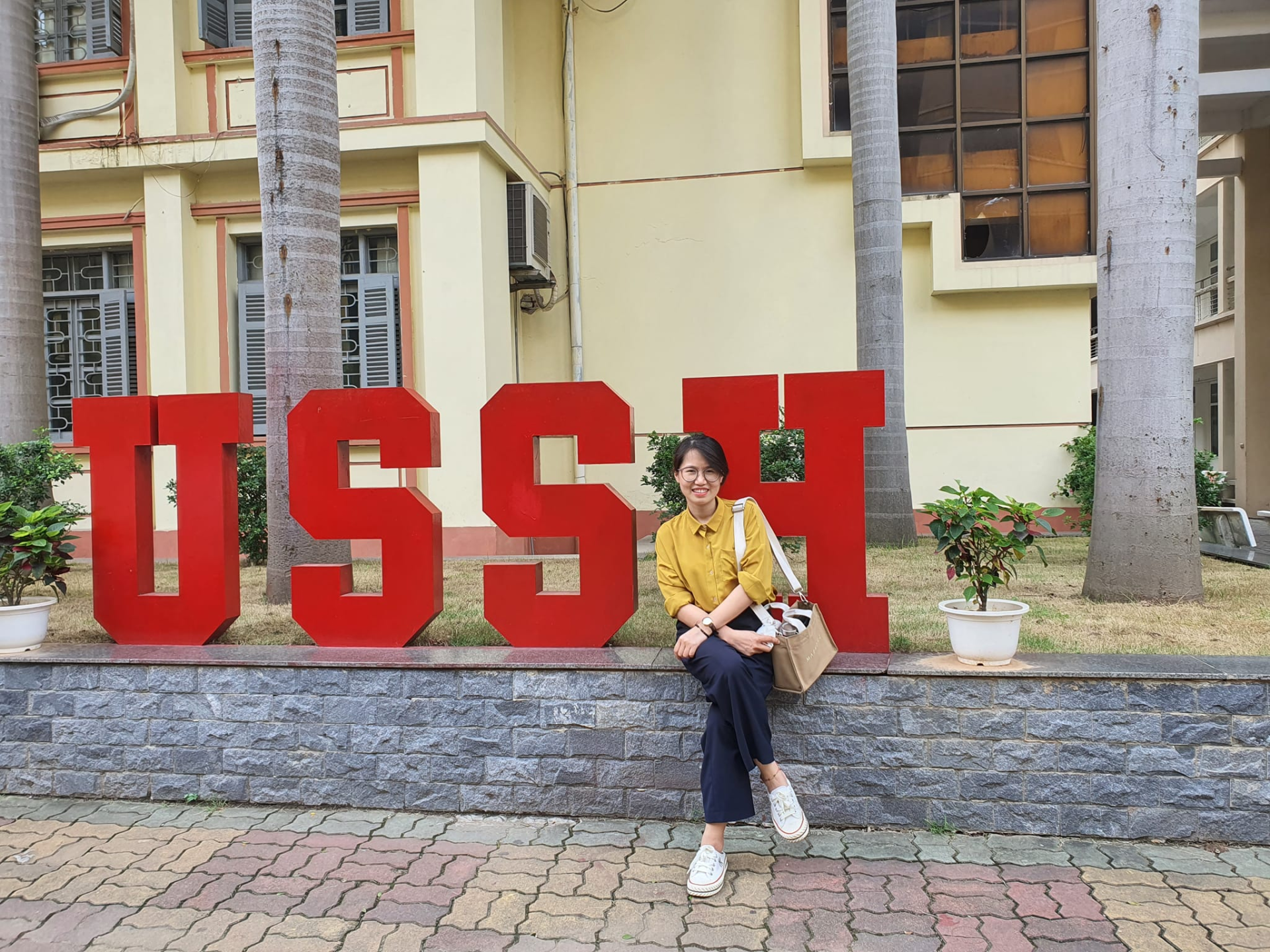Journalist Phan Thanh Thuy on a working trip to Truong Sa
Dear journalist Phan Thanh Thuy, what opportunity brought you to journalism?
Being a journalist is a matter of fate for me, because I have loved journalism since I was a child. My generation was probably not as careful in choosing a career as the current generation, so those who majored in literature would prefer to choose majors in the social sciences.
I have a special love for the Faculty of Journalism. In grade 7, I wrote articles for the Thieu Nien Tien Phong newspaper. In grade 12, I wrote for the Hoa Hoc Tro newspaper and some of my articles were published. When an article was published, many friends sent me letters and made friends because they liked my article. My first article was a reflection on students destroying the railway tracks. Due to difficult circumstances, they had to remove screws on the railway tracks. At that time, I wrote it in the form of a reflection. In grade 11, I was a contributor to the Hoa Hoc Tro newspaper and the School section introduced some outstanding students at universities, including a character named Giang - a student at the University of Social Sciences and Humanities, VNU, who shared his story about how he liked studying journalism and why he chose this school. Thanks to reading that article, I was determined to pass the entrance exam to the Faculty of Journalism and Communication, University of Social Sciences and Humanities, VNU.
The reason I chose the Faculty of Journalism first was because of my childhood interest, and during my time studying at the School of Humanities, at that time, most students wanted to become journalists. At that time, I studied with Mr. Dinh Van Huong and he said: "Each type of journalism has its own strengths and interesting things, but for journalists who love words and writing, most of them still like print newspapers, like to write so that the words can fly". At that time, I thought that I was suited to writing, so I chose to work in print and online newspapers. After graduating, my friends all chose to become journalists and most of them worked in print and online newspapers.
It has been 15 years since graduation, and most of my friends and I have stuck with that initial choice and have accumulated a lot of knowledge and experience in the profession. The love and luck of studying in an environment where teachers and seniors encouraged me has helped my learning process and career orientation go very smoothly. When I graduated, I was also very lucky to be accepted by press agencies for a trial period, I met their requirements and was guided and encouraged by journalists to have the motivation to try and strive for the profession.
Can you share some memorable memories in your journalism career?
I have many memories. The first one that I will never forget is the last year of university, when I studied with leading experts in journalism and media research and training such as Ms. Doan Huong, Mr. Vu Quang Hao, Mr. Dinh Van Huong, Mr. Duong Xuan Son... And among them is Mr. Tran Quang who taught the subject of Political Journalism. This is one of the very difficult subjects, but in his class, the whole class was always excited, chatting, asking questions. His leg was injured, walking was very difficult, but he always held the microphone and walked around the class to discuss with the students. At the end of the fourth year, we students heard that he had a stroke. The image of him lying on the hospital bed was very different from when he was in class with his passionate lectures. After graduating, we still visited him regularly, but he lost all his language, had difficulty speaking and could no longer write much. Later, the teacher made better progress, he was able to walk again, practice typing and practice speaking simple sentences. Currently, he also makes friends with students on Facebook and often interacts with all of their posts. Every time like that, my friends and I are very happy, because we see that the teacher still cares about the student generation. Those are feelings that I always cherish and treasure. On the occasion of the Institute of Journalism and Communication celebrating its 30th anniversary, my class visited the school again and met the teacher again. The memories of Mr. Tran Quang are the memories that I remember most during my time in university, until now I still cherish him very much.
Throughout my journalism career, the most memorable memory I have is the first character in my first article. During the summer vacation of my 4th year, a classmate encouraged me to practice writing about bigger, longer issues. My friend sent me the contact information of the character who lived near my house in Cam Pha, Quang Ninh so that I could take advantage of the summer vacation to write the article.
That day, I cycled to the stone factory where the character was working to find out. He was a prisoner who had been pardoned. When I met him, I was very surprised: He was thin and small, had white hair, an intellectual face, and was very open when sharing his story. I realized that this was a character who had gone through many events in his life, so when writing, I had to carefully consider every detail. This character had been exploited by many people before, so I focused on the happy aspect of a person who had gone astray. The article was published and was praised by the Editor-in-Chief, who said that the article, with the perspective of a young reporter, should have something good and new. At that time, I also thanked the friend who introduced the character to me, and he said something that I still remember: "When working as a journalist, don't be lazy." Even now, when I instruct young people, I always say that, emphasizing that I have to meet the characters and listen to their stories to have more material and emotions to write.
Journalist Phan Thanh Thuy on a reporting trip
How has your perspective on journalism changed over time as both a journalist and a journalism teacher?For me, the view on the profession does not change, but the nature of the job will change according to the development of science, technology and the reception needs of readers. The press prioritizes respecting the truth, journalists must always maintain professional ethics, no matter what stage of change. There is no such thing as half the truth is the truth, journalism must be the truth. If you cannot write a truly excellent news article, first, write a true and complete news article. Many people think that journalism has changed too much now, in fact, it is the change in the form of expression, but the view on the profession of those who do it seriously will never change. Journalism is a profession, not a great power. If you want to do the job, whether it is journalism or any other profession, you must be serious and love it. If you want to go long and deep in journalism, you must have ethics.
Can you share what you learned when you first started your career and whether it is still valuable today?What stuck with me when I first started my career and is certainly still valuable today is learning. Those who study communications and journalism have their own pride and strong ego, which brings many advantages, but sometimes also becomes their weakness. When I first graduated, I was asked by the editorial secretary to rewrite an article on my first tryout. Although I thought my writing was not bad, I still patiently read more works and revised them to suit the editorial style. This helped me gain more writing experience and also understand many things about attitude when facing work. Listening, humbly learning and frankly exchanging to understand each other better, that is the lesson that I still remember even after many years of working. Even now, I still have to learn from young people in applying technology to journalism. No matter what my starting point is, learning and being humble is never redundant.
In my time, people who did print journalism, social reporting, news reporting, and investigative journalism were more well-known and had more influence. Now, with the development of social media and many other channels and media effects, some journalism genres in my time have gradually decreased, such as social reporting or commentary, analysis, and editorials. Instead, there are news and new journalism genres such as e-magazines, infographics, videos, etc. In general, multimedia formats with eye-catching graphics are gradually dominating. Generation 8x journalists like me are having to learn a lot about modern journalism genres from generation 9x reporters, even generation Z.
Journalist Phan Thanh Thuy works at school
When observing and working with young people, what do you see as their strengths and what do you need to learn more about?Nowadays, young people have good technology skills, so they approach problems very quickly. They are passionate about their profession and very creative. With issues or characters that have been exploited by the press in the past, young people still have a different approach, still enthusiastically meeting the characters, taking photos, and asking questions directly. With the development of technology, young people not only choose to write articles, but also proactively use images and videos from the scene, create infographics, e-magazines... The thinking of young journalists is always new, diverse, curious and wants to understand thoroughly. For young journalists, they always ask detailed questions, and at the same time create better multimedia products, with the support of technology.
However, when working in journalism, young people also encounter some disadvantages. The biggest disadvantage is the lack of experience and sensitivity in using language. Young people are very quick to respond to new forms of expression in journalism, but with an article, content is the most important thing, it must be standard and then beautiful. In the context of competition with social networks, an article with a beautiful form will attract more readers. But if the article has substandard content, it will still receive criticism from readers. Sometimes, young journalists are very meticulous about the form but forget to carefully review to ensure the accuracy of the content (for example: in the fields of politics and society, it is necessary to have enough experience with expertise, to accurately grasp the names of documents, instructions, names and positions of organizations, individuals, etc. according to regulations). Do not use form to cover up erroneous content.
According to you, what qualities does a young person need to have if they want to become a journalist?First of all, to become a journalist, young people themselves need to have the right qualities for the job and the working environment. At the very least, they need to have an understanding and willingness to learn about the professional issues they are pursuing and have some personal strengths such as: good writing, creativity, dynamism, etc.
However, when working with young people - who are proficient in technology and do not hesitate to express their personal opinions, I also change my thinking. You cannot use the old approach to approach the current generation. Attitude and qualifications are two equally important issues. Young reporters can have strong personalities, high egos, and at the same time have good skills, are willing to contribute and learn. Therefore, young people entering journalism should remove prejudices, whether about form or attitude. Skills are what help you create good products, while attitude is something that can be commented on and adjusted together during the working process. And the most important thing is that your skills and personality are suitable for the job and working environment you choose.
Journalist Phan Thanh Thuy on a working trip in Hoi An
So what marks the maturity of a journalist, ma'am?For me, what marks the maturity of a journalist is calmness and lack of haste. This may sound absurd at first, as journalism is often associated with characteristics such as “fast” and “hot”. However, the development of social networks and the competition of many forms of information updates have made experienced journalists less hasty. When receiving information, a mature journalist always considers and asks questions: Is the information correct? What is the basis of this information? Is the writing style appropriate?...
There are many cases where information has spread rapidly on social networks, but journalists have not officially spoken out. That is because they have experience in handling information and know that they need to raise questions before coming to a conclusion. In particular, when faced with negative information, never distinguish right from wrong when there is no basis; if you have to report, you need to write very carefully. Therefore, the "maturity" of a journalist does not lie in being able to write quickly or write a lot, but in being meticulous, not rushing, giving yourself time to assess the accuracy, appropriateness and level of influence of the information.
In your opinion, what responsibility do journalists have for the social influence of the press today?Nowadays, journalism is being equated with fake journalism. Journalists need to be able to distinguish between newspapers, magazines, websites, social networks and other forms of fake journalism. In addition, journalists themselves need to accumulate reading capital by updating news on official newspapers. With the development of technology at the present time, it is easy to create a website similar to a newspaper page. Most readers do not have enough skills to distinguish between official journalism and fake journalism. This means that there will be a phenomenon of "mixing gold and brass", calling everyone "journalists". At this time, the role of journalists is to provide correct information, increase the reputation of official press agencies and spread carefully invested news articles to reduce some of the fake information. Journalists also need to share with the readers around them, helping them distinguish between official news sources and fake news sources.
The press itself needs readers, serves the needs of readers, therefore, still needs attractive writing techniques. Those techniques are only condemnable when they violate professional ethics, reducing the purity of the Vietnamese language. Choosing attractive titles is mainly to help readers grasp the core of the article. Phenomena such as "sensational headlines" and "view baiting" often appear in articles that are widely shared on social networks and are equated with journalism. Faced with this situation, journalists themselves have the responsibility to distinguish and explain to the public about the work they do.
With the development of readers' cultural level, I believe that negative phenomena will be resolved. Meanwhile, journalists need to be meticulous first, build prestige first, with careful, beautiful, and invested works.
Journalist Phan Thanh Thuy at the University of Social Sciences and Humanities, VNU
On the occasion of Vietnam Revolutionary Press Day June 21, what message do you want to send to young people who want to pursue a career in journalism?
Not all students who study journalism will become journalists and not all students who study journalism can become journalists. The profession chooses people, and especially journalism, whoever is suitable, whoever can follow it, will survive. Speaking specifically about the students at the Institute of Journalism and Communication, University of Social Sciences and Humanities, most of them are like me in the past: They love the profession and like journalism, like doing media, like traveling, like freedom, like having a new self, like writing, like contributing, then they choose to become students of Journalism.
First of all, if you have passion, that means you have 50% commitment to the profession. The remaining 50% is the effort to pursue the profession. Many articles and reports have shown that many students drop out after their first or second year of university. These cases are often students who feel they have chosen the wrong school, have no passion for the major, and depend on their family's guidance. However, most of the students who choose to study journalism are those who have had passion from before, so during the learning process, their passion is multiplied even more.
Many people say that university education in Vietnam cannot be applied to the knowledge after graduation. In my opinion, this is not true. It is like reading a book, you cannot read it today and apply it tomorrow. University time is the time to train the foundation of skills for your initial passions, and to cultivate more love and enthusiasm for you to stick with the profession.
Journalism is a tough profession. After graduating, the first years will be the most difficult period: economic, experience and health difficulties. It takes about two years for you to get used to and adapt to the job before you can gradually find stability. For young journalists, the difficulty is not a lack of skills, a bad attitude or not being compatible with the culture of the agency. The difficulty lies in your lack of experience and experience. Young people and experienced people working together will easily have conflicts about experience and understanding. The difference in views on life and work will make it difficult for you to find a common voice in the workplace. After a few times like that, your enthusiasm for the job will fade. You must be really persistent, must adapt to gain more practical experience, prepare your health to meet the characteristics of traveling a lot, rolling around a lot of the job, must find a way to balance work and life, then you can stick with the job. Young people, don’t be in a hurry. Journalism is often referred to with the keywords “fast, hurried, hot”, but with a career, there is no hurry. Keep your love for the job and keep learning. The more you travel, the more you come into contact with special situations, with people that after interviewing you will remember forever, and you will feel more in love with life. That means you have been attached to the job. Spend the first two years on the collisions, the dizziness, if you still have enough love for the job, you will be able to follow the job and live with it.
Thank you for sharing, journalist Phan Thanh Thuy. Wish you success in your upcoming projects!




